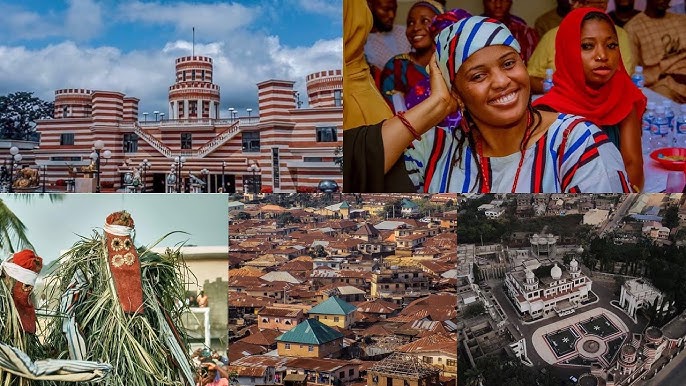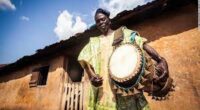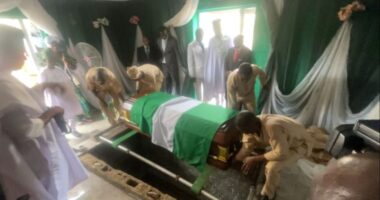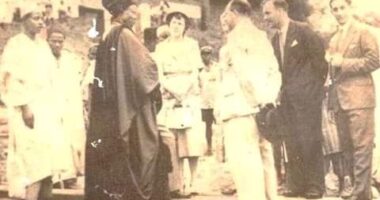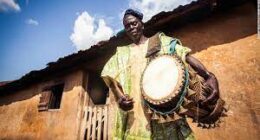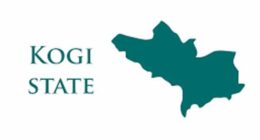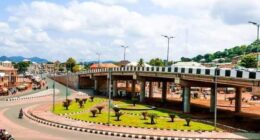Ebira / Igbira / Igbirra
The Ebira (also spelt Igbira or Igbirra) are the outspoken and very hard working agrarian Nupoid-speaking ethno-linguistic group located in the Central Senatorial district of Kogi State (not far from the Niger-Benue confluence) in Nigeria.
Many Ebira people are from Kogi State, Kwara State, Nasarawa State, Federal Capital Territory, Abuja, and Edo State. Okene is said to be the administrative centre of the Ebira-speaking people in Kogi state.
The word “Ebira” refers to the people themselves, their language and their geographical location. Using the name of the most popular town of the land, we may refer to them as Ebira Okene. The Ebira Okene occupy the hilly stretch of land southwest of the Niger-Benue confluence area and share boundaries with the Yoruba-speaking people of Akoko, Owe and Ijumu to the west; the various Akoko-Edo people to the south and south west; the Hausa, Nupe and Ebira groups at Lokoja to the north; and the River Niger to the east.
History
There are two schools of thought about the Ebira origins. The written source (archeological) and the oral traditions. The Ebira, through oral tradition, trace their descent to Wukari (in the present Taraba state) where they were a constituent part of the Kwararafa confederation. In about 1680 AD, they (along with the Idoma and Igala) migrated out of Wukari a chieftaincy dispute. The Ebira later split into various groups and settled in different locations between 1680 and 1750 AD. The Ebira Tao first sojourned with the Igalas at Idah but later crossed the River Niger and settled at Ebira Opete located the vicinity of Upake in Ajaokuta LGA. The ‘father’ of the Ebira Tao who led them to this premier settlement in Ebiraland was Itaazi. Itaazi had five (5) sons who all later migrated from Ebira Opete and were the founders of the various districts in Ebiraland. The children and the districts they founded are Adaviruku/Ohizi (Adavi), Ododo (Okehi), Obaji (Eyika), Uga (Okengwe) and Ochuga/Onotu (Ihima). His daughter named Ohunene settled in Eganyi district. Members of the various clans in Ebiraland are descendants of the children of Itaazi. Ohizi had five children who are progenitors of the five traditional Adavi clans named after them. These are upopo-uvete (Apasi), Uka, Idu (Aniku), Adeyika and Uhwami. A migrant group from Eganyi known as Ezi-Onogu clan is also found in Adavi. The sons of Ododo who are the ancestors of Okehi clans were Okovi Oviri and Enwgukonyai. Obaji the founder of Eika had ten children named Ohiaga, Iyewe, Avassa, Ehemi, Anchi, Epoto, Egiri, Ubobo, Ogu and Eyire. Uga of Okengwe had two sons whose children constitute the present Okovi and Agada group of clans. Due to a sizeable concentration of other Ebira clans in Okengwe district, they formed a socio-political coalition known as Ada-ehi. Ochuga had six children and their descendants make up the six clans in Ihima. These are Emani, Oha/Idu, Ohueta, Ure, Ohongwa and Odumi. The seventh clan is Akuta who migrated from Okengwe. Though Itaazi’s daughter named Ohunene was the founder of Eganyi, not all the clans there are descended from her. Eganyi clans are Ede, Esugu, Eheda, Ogu, Onoko, Idu, Anavapa and Ogodo. The Aningere who are skilled craftsmen are found in all districts. They are, however, more concentrated in Okengwe and Adavi districts.
From the written source, Ohiare (1985) linguistically defined Ebira as those who speak the language or dialect called Ebira or those who recognize themselves as one but have lost touch of the ability to speak the language as a result of some historical development. Describing their location, Ozigi (2004) said that Ebira are predominantly in the Niger–Benue confluence area and scattered in locations as Okene, Okehi, Adavi and Ajaokuta. These are the Ebira Tao group of the central senatorial District of Kogi State.
There are also the Ebira kotos. They are found in Koton Karfe area of Kogi Local Government of Kogi State. There is the Ebira Mozum of Bassa Local Government area of Kogi State.
There are large Ebira settlement in other areas apart from Kogi State as found in Umaisha, Toto, Lafia District of Nassarawa State and Federal Capital Territory. There is also Ebira Agatu in Benue State, Ebira Etuno in Igarra area of Edo State.
The concern of this paper is the Ebira Tao group. Historically, the people belong to the Kwararafa or Apa group of the middle belt region. Among the other ethnic group in the Kwararafa region are the Jukun, the Igala, the Idoma, the Langtang, Kaje etc. The tradition of origin of the Ebira Tao first started in the Gongola Basin and ended with their migration to the lower Benue valley.
The Ebira took their name from the lower Benue valley. They described themselves as people from Ebira. Tradition collected from among the Idoma say Ebira were already in the area of Abinse down to the area of modern Agatu district when Idoma ancestors met them. This was about the 15th and
16th centuries as claimed by Ohiare (1985). This indicated that the Ebira presence around the Benue valley was about the 14th Century.
It was from here that the wave of migration dispersed the Ebira and other associated groups to the confluence area. From here also the people migrated to Ebira opete and the Okehi hills.
Several reasons were given for this migration. They were succession disputes, outbreak of epidemics, and flight from punishment which the people considered as unjustified and oppressive.
There is yet another period of Ebira historical development. This began with their migration across the Niger at Itobe to the right bank of the Niger around the present location of Ajoakuta. This place was known as Ebira opete.
The Ebira had to move further from the Igala territory for obvious reasons of succession. It was a common practice in the royal circle of Idah that the losing side in succession dispute was always obliged by tradition to move out of the capital enmasse to the inland and sometime beyond the boundaries of the Kingdom (in this case, the Ebira belonged to the losing side and so had to move).
According to Ozigi (2004) the dominant theme in the struggle of the Ebira opete settlers was to secure political independence of Attah in Idah. So, it was their desire to be rid of Idah’s political influence. This forced the people to begin gradual westward. Some settled in Okehi and Upai hills and others in Egarra (Etuno) area. From Opete the Ebira moved gradually in families, lineages and clans to the hills of Okehi, Upai and Eikaoku, a compact area chosen for security purposes.
Political organization of the people in their new area reflected the settlement patterns based on family lineage and clan group conducted its affairs as a semi autonomous entity. In each clan group, lineages often acted independently. The leaders of these clan groups never failed to strengthen their political authority through religious sanctions ordained by the ancestors. Institutions of ancestral cults featured spirits like “Eku oba”, “Eku echichi”, akatapa’, and “Eku irahu”, that gave political potency to their religious sanctions.
By mid 19th century, the Ebira had settled permanently in their present locations and lived in the district founded by the ancestors. Various settlements were founded by the Ebira children like Okovi, Agada, Eika, Adavi, Ihima and Eganyi. These settlements were named after them. The main clans and sub clans in Ebira settlements were as follows:
Okovi (Asuwe, Adobe, Ehebe, Omavi, Ure and Omoye as sub clans)
Agada (Akuta, Avi, Ogu, Esusu, and Ohimoroko as sub clans)
Eika (Ihiaga, Iyewe, Avasa, Eyire, Epoto, Anchi, Iheme, Agiri, Ubobo, Uhuodo and Ogu as sub clans)
Adavi (Aniku, Uhami, Uka, Upopo uvete as sub clans)
Ihima (Emani, Ure, Ohueta, Odumi, Ohionwa and oha as sub clans)
Eganyi (Eheda, Onoko, Esugu, Ogodo, Onogu, Ede and Ogu as sub clans)
These clans were very important in the socio–political life of the Ebira people. They were the basis of authority and social relations in Ebira traditional community.
By the mid 19th century, about the 1860’s the Jihadists invaded the Ebira settlement and distorted their socio–political organization. The Jihadists, under the leadership of Madaba from Bida, first incursed into the Okene area by way of raiding. For the first time, the Ebira were faced with formidable and a united force under a purposeful and dynamic leadership that could challenge these Jihadists. These leadership traits were found in Ohindase Ukpai and he did put very strong resistance in this direction.
In the second incursion, which came about the 1870’s, was a combined force of Bida, Ilorin and Ibadan under Nupe leadership. With a determined and united Ebira under the Leadership of Ohindase Avogude, the Ebira resisted once again. It is quite impressive to note that of these Jihadists’ incursions in Ebira was successful. It is also noteworthy that these incursions had set the people on the way to central Leadership.
Under colonial rule, the people of Ebira lost their sovereign right. The existing structures were dismantled and replaced with new ones. There was imposition of colonial agents through whom the colonialist communicated with the people. There was the imposition of poll tax (Ekehi irehi or house
money), there was forced labour to construct rail lines, road network, etc.
The people resisted patriotically colonial imposition in various ways. Ibrahim (1985) identified that there were military resistance against the colonialists in such places like Ikuehi, Kuroko and Okene.
These various oppositions to colonial imposition led to the Oyibo Arimo crisis of 1924 and 1926. It was these series of crisis that culminated into the formation of Igbira Tribal Union (ITU) that constituted a major political force in the post independent era.
When the British invaded and conquered Ebiraland at the beginning of the century. The people found a confederation of five-clan groups (they are Eika, Okehi, Adavi, Okengwe, and Ihima) each operating a devine form of government as established by Ododo of Okehi and Obaji of Eika (the two greatest heroes of Ebiraland).
Following a breakdown of traditional law and order as a result of wars, migration, famine etc the two heroes enthroned cult of eldership, resuscitated the masquerade cult and established iragba and the masquerade as the institution of government and instrument of discipline respectively. Ododo and Obaji also established a devine form of chieftaincy. The installation of the Chief priest was linked with the Iragba and the priest elect would pass through a ceremony of death and masquerades and was finally installed by the Ekuoba.
Each clan group in Ebiarland was politically autonomous with its clan’s chief priest rotating among the clans in order of seniority. This was the situation until the invasion of the Ajinomoh in the second half of the 19th century. As from 1900 the British took over Ebiraland, created Kabba Division and appointed Owudah Adidi as agent in 1902 Omadivi took refuge in the house of Owudah Adidi at Obangede. Omadivi was a widely traveled man. He appreciated the white man’s power and motive for invading Ebiraland. He quickly allied with them. Omadivi had wielded much power around himself and events worked in his favour when in 1904 he was installed the chief of Ebiraland after the Major Marsh expedition which sacked Okene.
In 1917, Omadivi died as the District Head of Ebiraland and the stage was set for the struggle for his position. Among the contenders for this position were Ohindase Arudi Adano, Ibrahim Chogudo Onoruoiza and Ozigizigi of Obehira.
Ibrahim Onoruoiza won the contest at the youthful age of 17 amidst bitter opposition. The credentials that won him this position included high level of intelligence, brilliant and efficient performance as white man’s tax assessment scribe and messenger. Ibrahim immediately commenced his activities to
open up roads to Ajaokuta and Lokoja for trading activities. Fascinated by the work of Ibrahim, the British Resident officer, Mr Byng-Hall created Ebira Division with the Attah as the Sole Native Authority.
